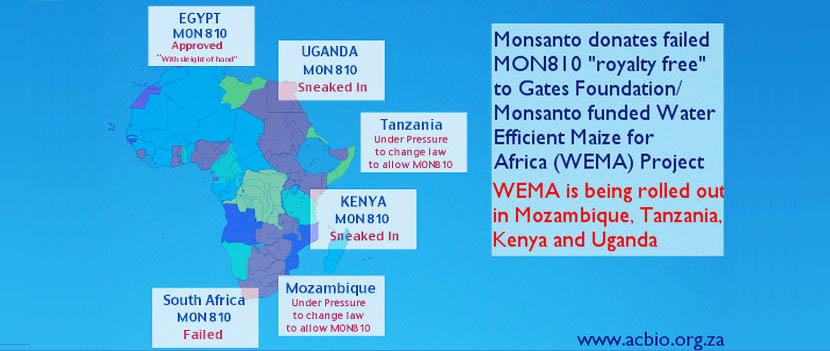
A new report shows how a Monsanto GM maize, which failed in South Africa, is now being foisted on the rest of the continent by sleight of hand.
Monsanto's failed SA GM Maize pushed into rest of Africa
African Centre for Biosafety, 24 October 2013
http://www.acbio.org.za/index.php/publications/rest-of-africa/447
Today the African Centre for Biosafety (ACB) released a new report, "Africa bullied to grow defective Bt Maize: the failure of Monsanto’s MON810 maize in South Africa", showing how Monsanto’s GM maize, which utterly failed in SA, is now being foisted on the rest of the continent, through "sleight of hand".
Independent scientists have shown that Monsanto’s GM maize variety, MON810 – which has been growing in SA for 15 years – has completely failed due to the development of massive insect resistance, leading to the GM maize being withdrawn from the SA market. Monsanto has compensated farmers who were forced to spray their crops with pesticides to control the pests, calling into serious question the very rationale for GM crops.
According to the Director of the ACB, Mariam Mayet, "Monsanto got the science completely wrong on this one. Independent biosafety scientists have discovered that the inheritance of resistance in African stem borers is a dominant, not recessive, trait as erroneously assumed. Hence the insect resistance management strategies that Monsanto developed, and accepted by our regulators, based on these erroneous assumptions, were utterly ineffective."
Undeterred, Monsanto is now pushing its flop GM maize onto the rest of the continent. According to the ACB report, Monsanto has now donated its MON810 GM technology "royalty-free" to a Gates Foundation/Monsanto funded "philanthropic" project, Water Efficient Maize for Africa (WEMA). WEMA is being rolled out in Mozambique, Kenya, Uganda, and Tanzania. The defective GM maize is set to be approved for commercial growing by 2015.
WEMA was first touted for a good number of years, with much fanfare, as a charitable project intent on bringing drought tolerant maize varieties to resource poor African small farmers. However, with a sleight of hand and stony silence, WEMA has included MON810 into the mix. Field trials with MON810 are already running in Kenya and Uganda. In response to the project, the Mozambican government is now changing its biosafety laws to allow for the cultivation of GM crops while WEMA is pressurising the Tanzanian government to change the country’s biosafety law that will hold Monsanto strictly liable for damages that may arise.
According to researcher with the ACB, Haidee Swanby, "WEMA is a convenient vehicle for Monsanto to gain regulatory approval for its controversial technology in African countries. However, 'royalty-free' seed simply means that resource-strapped commercial farmers will get the seed at the same price as hybrid seed, which means that these seeds will be prohibitively expensive. The patents on the gene sequences still reside with Monsanto, and farmers will have to pay premium prices for the GM seeds."
The ACB report also highlights that Monsanto’s MON810 GM trait has been genetically engineered into a local Egyptian maize variety called Ajeeb. "Ajeeb Yieldgard" has now been patented by Monsanto and "approved" for commercial growing through circumvention of the Egyptian biosafety law. Significantly, the report highlights that the Egyptian government has published peer reviewed independent and publically funded biosafety studies on MON810 showing serious risks to human and animal health.
Said Swanby, "The scariest revelation is that GM producers and regulatory authorities are making it all up as they go along, while the massive biotech PR machinery spreads the myth that these crops are connected to feeding the poor in Africa."
Download the full report
http://www.acbio.org.za/index.php/publications/rest-of-africa/447
Contact:
Haidee Swanby 082 459 8548
Mariam Mayet 083 269 4309









